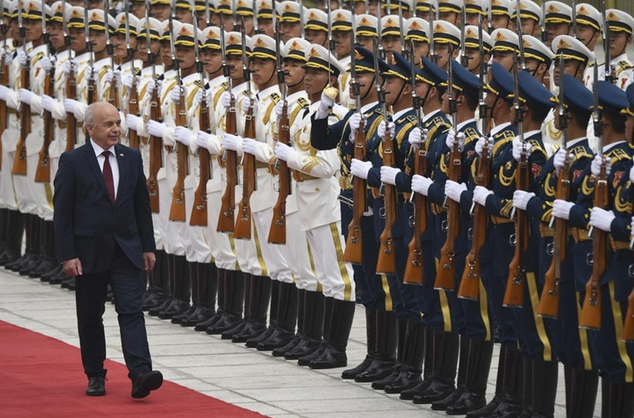
Ueli Maurer reviews guards during a welcome ceremony at the Great Hall of the People in Beijing on April 29 (Keystone / Madoka Ikegami / Pool)
Ueli Maurer, who holds the rotating Swiss presidency this year, was set to meet Russian President Vladimir Putin in Moscow on Thursday. It is Maurer’s fourth foreign visit this year that has raised eyebrows in Switzerland.
Most controversial was his trip in October to Saudi Arabia, which had already been postponed after the murder of Saudi journalist Jamal Khashoggi by Saudi operatives sparked global outrage.
Maurer, a member of the right-wing Swiss People’s Party, was criticised for visiting a country with such a poor human rights record – just as he had been in April when he travelled to Beijing, where he was received by his Chinese counterpart Xi Jinping.
+ What do Swiss presidents actually do?
Both of those visits, as well as his current trip to Moscow, highlight the tightrope act that is Switzerland’s foreign policy: balancing economic and financial interests with the country’s much-vaunted commitment to human rights.
While some people think official visits to places like China, Saudi Arabia and Russia send the wrong message, others reckon speaking to everyone is part of Swiss foreign policy and certainly doesn’t mean that Switzerland agrees with everyone.
Then there was Maurer’s surprise visit to US President Donald Trump. This got people talking, but for other reasons: Maurer became the first Swiss president to be received in the White House by a US president.
Switzerland and Russia enjoy good relations, but top-level visits are rare. The previous visit by a Swiss president to Putin in Moscow was Didier Burkhalter in 2014, the same year that Maurer spoke to Putin for the first time, at the Winter Olympics in Sochi.
The government said in a statementexternal link that issues set to be addressed on Thursday include the conflicts in eastern Ukraine, the South Caucasus and Syria, as well as Switzerland’s peace-building efforts in these regions.
Maurer’s trip to the Gulf and his meeting with the controversial King Salman ruffled several feathers – not least because one of the king’s sons, Crown Prince Mohammed bin Salman, is alleged to have played a role in Jamal Khashoggi’s death.
Maurer’s U-turn, after a previously planned trip had been cancelled, was seen by the media as the “return to normalcy” that Maurer had called for at the World Economic Forum annual meeting in Davos in January.
He was accompanied to Saudi Arabia by a delegation of Swiss bankers, who see a lucrative market in the oil-rich state, which is in favour of privatisation. The aim of the visit, which also took in the United Arab Emirates, was “to strengthen financial and economic relations with the two most important Gulf states for Switzerland”, according to the finance ministry.
The announcement took everyone by surprise – by the time the news was made public, Maurer was already sitting in a plane heading for Washington to become the first Swiss president to be officially received in the White House by an American president.
Maurer and Trump chatted for about 40 minutes and discussed a possible bilateral free-trade agreement. The US is Switzerland’s second-largest trade partner. Trump also thanked Maurer for Switzerland’s good offices: Bern represents US interests in Iran and possibly in the future in Venezuela.
The Chinese president invited Maurer to Beijing on a state visit. The Swiss president was accompanied on his one-week by a delegation of finance and economic representatives. Critics complained that Switzerland was being instrumentalised by China.
Maurer defended the trip, saying it was important for Switzerland to take part in the Belt and Road summitexternal link and gain an advantage for Swiss companies. Many other Western companies are much more critical of the massive infrastructure project than Switzerland.
(Translated from German by Thomas Stephens) Full story here Are you the author? Previous post See more for Next postTags: newsletter,Politics,Ueli Maurer,Vladimir Putin



























